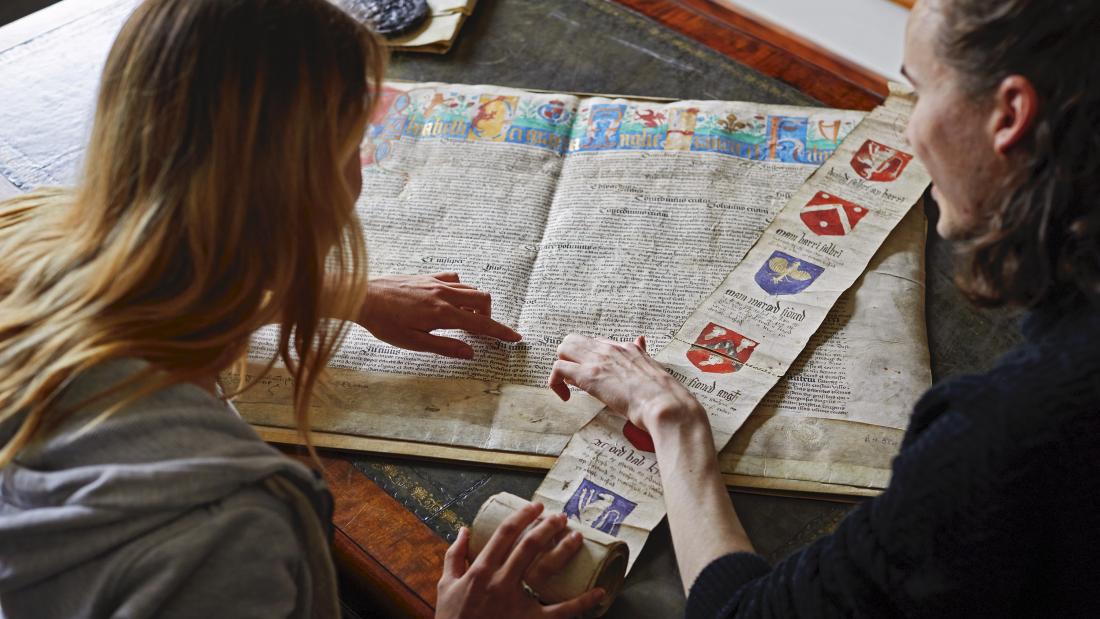About This Course
This modular degree scheme is designed to allow students to further their undergraduate interest in history, and to develop the skills and knowledge needed to undertake further research into the past. It combines training in research techniques and theoretical and historiographic analysis, with a wide range of taught courses, skills modules and a supervised dissertation. There is a choice of specialist modules covering a range of periods from medieval to contemporary history, matching the research interests of the teaching staff.
This programme aims to provide a detailed knowledge and understanding of a specific academic area through rigorous research training. Students will become acquainted with relevant historical theoretical issues and methods of interpretation and the use of evidence. It also provides the student with the necessary research skills to carry out an original piece of historical research in the chosen area of study, under supportive supervision.
Programme Length
MA: 1 year full-time or 2 years part-time; Diploma: 30 weeks full-time.
Course Content
What will you study on this course?
An MA will be awarded on successful completion of all 180 credits. A Diploma will be awarded on the successful completion of the first 120 credits
Part One:
In the first part of the MA programme, all students are required to study a combination of compulsory and optional modules.
All students study the following compulsory modules:
- Themes and Issues in History (20 credits): This module encourages an understanding of current ideas and debates through in-depth and critical discussion and also engages with the theoretical and philosophical context of different approaches. Discussions will be grounded, where appropriate, in specific examples and students will be encouraged to apply the ideas and critiques to a range of different case-studies. The module will develop skills in critical thinking and the ability to participate in debates on issues of interpretation and methodology
- Research Skills (40 credits): This is an advanced level skills module that has three aims: to train students to initiate research projects, to familiarise them with how to critique a research seminar paper and to supply them with skills that will enhance their employability.
In addition, students will follow a 20 credit documentary and sources module that introduces students to a wide range of kinds of sources and the problems of interpreting sources, their transmission, reception and survival. Students choose either Documents and Sources: Medieval & Early Modern, or Documents and Sources: Modern
In addition, students are required to choose two further modules from those on offer. While modules may vary from year to year, recent options include:
- Nation States and Empires in the Pre-Modern World
- Re-interpreting the Country House
- Global Wales: Places Passions and the Past
- Work Placement
- Understanding the Middle Ages
- Nationalism and Minorities
- World Heritage
- People, Power and Political Action: Protest Movements in Europe 1817-1989
Part Two:
After the completion of the modules which make up Part One of the programme, Part Two consists of a 15,000 to 20,000-word dissertation (60 credits) on a subject of your choice, researched and written under the individual supervision of a subject specialist. Your dissertation will set research questions and a structure will be worked out. It will describe and analyse the chosen topic using a range of relevant secondary and primary evidence.
Modules for the current academic year
Module listings are for guide purposes only and are subject to change. Find out what our students are currently studying on the History MA Modules page.
Course content is for guidance purposes only and may be subject to change.
Entry Requirements
A 2(ii) Honours degree is required, or equivalent qualifications.
IELTS: overall score of 6.0 (with no element below 5.5) is required.
Careers
An MA in History is a versatile qualification and will give you a detailed understanding of the discipline and the ability to conduct research at various levels of historical analysis. It will enhance your career opportunities in a range of professions in the media and communications industries, teaching, heritage and museums, public administration, publishing and research. The transferable skills acquired through this programme are beneficial in a range of other careers, including advertising, journalism, consulting etc. After successful completion of the MA in History you may also decide to pursue an academic career in History, by applying for a place to study for a PhD in History.


